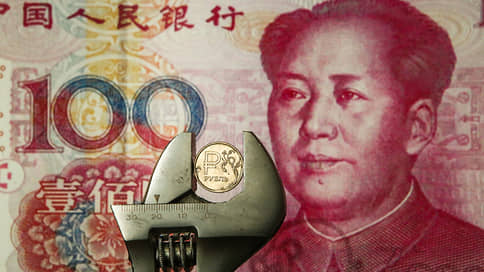The yuan expanded into portfolios – Newspaper Kommersant No. 39 (7484) of 03/07/2023
[ad_1]

Against the backdrop of the Central Bank’s course to devalue bank balance sheets, the volume of corporate loans in Chinese currency is growing. They are offered by an ever wider range of players. The growth is explained both by rates lower than those for ruble loans and by the demand for converting loans from unfriendly currencies. But it will not be possible to completely replace dollar loans with new instruments, experts say.
According to a Kommersant survey, Russian banks are confidently increasing the volume of lending to corporate clients in yuan. So, at the end of February, Alfa-Bank’s portfolio exceeded CNY 18 billion, and Rosbank’s portfolio was about CNY 2 billion. The loan portfolio of Sberbank by the end of 2022 amounted to about 9 billion CNY (previously, the bank disclosed preliminary figures; see Kommersant of December 26). “We mark customer demand for yuan. It is due to a reorientation to Asian markets, exporting companies attract financing in yuan,” Sberbank notes.
At Zenit Bank, where the first loan tranches began to be issued in December, by the end of February, about 10% of the loan portfolio of large companies accounted for the yuan. “The growth is associated with both new issuances and the replacement of dollar loans with yuan ones,” Zenith explained.
According to the Central Bank for January-September 2022, the high activity of banks in issuing loans in yuan manifested itself in September 2022, when a number of large banks launched such a product. Then 45.9 billion rubles were immediately issued. loans (about 5.4 billion CNY), and for three quarters – by 67.2 billion rubles. (about 8.4 billion CNY). In February 2023, for the first time, the yuan became the most traded currency (with the calculation “tomorrow”), displacing the permanent leader – the US dollar (see “Kommersant” dated March 6).
At the same time, the overall currency value of the corporate portfolio is declining and, according to the Central Bank, at the beginning of February 2023 was 16.2% against 24.2% a year ago. As the head of the financial analytics center of Sberbank, Mikhail Matovnikov, notes, “both banks and borrowers are less willing to take on currency risks.” “The demand for foreign currency lending in yuan exists because some companies have a natural hedge, that is, expenses and incomes are denominated in the same currency,” the expert clarifies.
As the vice-president of Novikombank noted (the bank began lending to large enterprises from among the top 100 in yuan about six months ago) Maxim Yakovchenko, “in the context of a sharp reduction in the use of Western currencies, the volume of settlements of our clients participating in foreign economic activity, not only in Russian rubles, but also in alternative foreign currencies, primarily in Chinese yuan.
Therefore, the reduction in the currency share of the loan portfolio will occur primarily at the expense of the currencies of unfriendly countries, while the share of yuan loans will increase. Currently, the volume of the portfolio in SDM Bank is an insignificant share, but the bank expects that by the end of 2023 “it will grow several times,” said Vyacheslav Andryushkin, deputy chairman of the board of the bank. The current volume of lending in yuan at Soyuz Bank is “small”, but they see “good potential” for its growth. Many foreign trade contracts continue to be converted to yuan for more convenient payments, the IBC added.
MTS Bank (launched lending in yuan in December 2022) believes that the attractiveness of yuan loans is further increased by the fact that their rates are lower than in rubles. The average actual market rate does not rise above 6-7% per annum, “which is quite attractive for borrowers,” confirms Mr. Andryushkin.
Against the backdrop of growing lending in yuan, banks are also seeking to increase their portfolio of liabilities by raising rates on deposits of individuals. Sberbank raised them to 2.59% per annum, VTB – up to 3.01% per annum, Alfa-Bank – up to 2.7-3%, GPB – up to 1.5%, Novikombank – up to 2.6% per annum. Alfa-Bank plans to actively increase its yuan portfolio “provided that the situation with local liquidity in this currency will allow a commensurate increase in the passive base.”
However, according to Mikhail Matovnikov, lending in Chinese currency “will never replace lending in dollars and euros in the volumes of previous years, because the main trend is devaluation.” Thus, the Central Bank announced that it was raising the norms of required reserves for foreign currency obligations from March (by 2 percentage points, to 7%). “And no exception was made for the yuan,” emphasizes Mr. Matovnikov.
In addition, banking expert Alexei Nechaev notes, exporters’ demand for investments is falling, and they are already able to finance working capital and the required minimum capital expenditures with their operating cash flows. According to him, “the few examples of yuan bond placements also raise doubts that yuan loans will take a significant share in banks’ portfolios.”
[ad_2]
Source link





